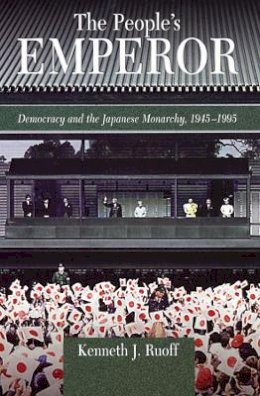
The People's Emperor. Democracy and the Japanese Monarchy, 1945-1995.
Kenneth J. Ruoff
Few institutions are as well suited as the monarchy to provide a window on postwar Japan. The monarchy, which is also a family, has been significant both as a political and as a cultural institution.
This comprehensive study analyzes numerous issues, including the role of individual emperors in shaping the institution, the manner in which the emperor’s constitutional position as symbol has been interpreted, the emperor’s intersection with politics through ministerial briefings, memories of Hirohito’s wartime role, nationalistic movements in support of Foundation Day and the reign-name system, and the remaking of the once sacrosanct throne into a “monarchy of the masses” embedded in the postwar culture of democracy. The author stresses the monarchy’s “postwarness,” rather than its traditionality.
Product Details
About Kenneth J. Ruoff
Reviews for The People's Emperor. Democracy and the Japanese Monarchy, 1945-1995.
Victoria James
New Statesman
The People’s Emperor is certain to be one of the most-discussed books of the coming year.
International Herald Tribune/Asahi News Service
This intriguing and rewarding monograph examines the manner in which the Emperor system has been reinvented in postwar Japan to reflect and reinforce democratic values. Kenneth Ruoff successfully challenges some prevailing myths and stereotypes about modern Japan and helpfully unravels distorting monolithic images about right-wing politics. His interesting discussion of constitutional controversies and key issues that expose cross-cutting political cleavages provocatively recasts the political landscape, clarifies some of the paradoxes of the polity and demonstrates that civil society is neither as anemic or stagnant as some writers suggest.
Jeff Kingston
Japan Times
A stimulating analysis of the contemporary Japanese monarchy.
Philippe Pons
Le Monde
Kenneth J. Ruoff’s scholarly yet lucid account of the emperor’s role in post-war Japanese society is a timely addition to the literature on this intriguing institution. It also provides a fascinating insight into post-war Japan’s political struggles… This is an excellent work of accessible history. Sensitive to the nuances of an enigmatic political culture, it is perhaps best recommended for those already with an interest in Japan.
Ed Wright
South China Morning Post
[A] remarkable book… An even-handed, astute and often entertaining account of the Japanese monarchy in the latter half of the 20th century.
Velisarios Kattoulas
Far Eastern Economic Review
Ruoff’s book is a fine study with appeal well beyond academe.
Richard Read
Oregonian
Ruoff argues that the myth of the Japanese monarch was invented to preserve the imperial system in the postwar era after the WWII defeat… Ruoff argues that Hirohito was more actively involved in the decision making in the wartime military government than has been thought. What is new is that Ruoff describes the evolution of the monarch in the postwar period—the monarchy’s efforts to transform itself from a once-sacrosanct throne into a ‘monarchy of the masses,’ especially by Hirohito’s son, Emperor Akihito… [This is] a fine study of the Japanese postwar imperial system.
M. Itoh
Choice
